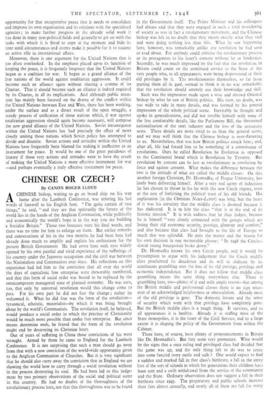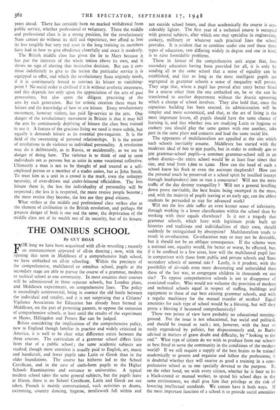CHINESE OR CZECH?
By CANON ROGER LLOYD
ACHINESE bishop, waiting to go on board ship on his way home after the Lambeth Conference, was uttering his last words of farewell to his English host. "I'm quite certain of two things," he said, "and they are that spiritually the future of the world lies in the hands of the Anglican Communion, while politically and economically the world's hope is in the way you are building a Socialist Britain." Those two forecasts were his final words, and there was no time for him to enlarge on them. But earlier remarks and conversations of his in the two months he had been here had already done much to amplify and explain his enthusiasm for the present British Government He had come here with eyes widely opened by his own painful and vivid experience of the sufferings of his country under the Japanese occupation and the civil war between the Nationalists and Communists ever since. His reflections on this experience had led him to the conviction that all over the world the days of capitalistic free enterprise were inexorably numbered, and that this form of social order was bound to be replaced by the omnicompetent managerial state of planned economy. He was sure, too, that only by universal revolution would this change come to pass. For his own part he did not fear the change ; rather he welcomed it. What he did fear was the form of the revolution— tyrannical, atheistic, materialist—by which it was being brought about by the world's Communists. The revolution itself, he believed, would produce a social order in which the practice of Christianity would be much more possible than under free enterprise. But since means determine ends, he feared that the form of the revolution might end by destroying its Christian heart.
Out of years of suffering in China those convictions of his were wrought. Armed by them he came to England for the Lambeth Conference. It is not surprising that such a man should go away from that with a new conviction of the world-wide opportunity given to the Anglican Communion of Churches. But it is very significant that he should also carry away the conviction that in England we are showing the world how to carry through a social revolution without in the process destroying its soul. He had been led to this judge- ment by two primary observations of the social and political scene in this country. He had no doubts of the thoroughness of the revolutionary process here, nor that this thoroughness was to be found in the Government itself. The Prime Minister and his colleagues had always said that they were engaged in such a total re-ordering of society as was in fact a revolutionary movement, and the Chinese bishop was left in no doubt that they meant exactly what they said and were doing nothing less than this. What he saw happening here, however, was remarkably unlike any revolution he had seen or read about. For anybody could criticise the revolutionary process or its protagonists to his heart's content without let or hindrance. Secondly, he was much impressed by the fact that the revolution in Britain could count on the continued service to the State of the very people who, to all appearances, were being dispossessed of their old privileges by it. The revolutionaries themselves, so far from putting them all in gaol, seemed to think it in no way remarkable that the revolution should serenely use their knowledge and skill.
Such was the impression made upon a wise and shrewd Oriental bishop by what he saw of British politics. His view, no doubt, was too wide to take in many details, and was formed by his general impression of the whole political scene. Inevitably he thought and spoke in generalisations, and did not trouble himself with some of the less comfortable details, like the Parliament Bill, the threatened nationalisation of the steel industry and the loss of the university seats. These details are more vivid to us than the general scene, and we may well think that the Chinese bishop is over-flattering to us. Nevertheless, that was how British politics struck him ; and, after all, life had forced him to be something of a connoisseur of revolutions. Ours he called Revolution by Evolution as opposed to the Continental brand which is Revolution by Tyranny. But revolution by consent can be just as revolutionary as revolution by force and against consent. What makes the difference between the two is the attitude of what are called the middle classes. On this another foreign Christian, Dr. Hromadka, of Prague University, has lately been delivering himself. After a very real agony of indecision he has chosen to throw in his lot with the new Czech regime, even at the cost of forfeiting the political trust of his old friends. His explanation (in the Christian News-Letter) was long, but the heart of it was his certainty that the middle class is doomed because it has abdicated. It is to him the class " that is at the end of its historic mission." It is with sadness that he thus judges, because he is himself "very closely connected with the groups which are losing their old economic security, prestige, glamour and comfort," and also because that class had brought to the life of Europe so much that was splendid. He puts the matter and the reason for his own decision in one memorable phrase: "In 1948 the Czecho- slovak young bourgeoisie broke down."
Dr. Hromadka knows his own Czech people, and it would be presumption to argue with his judgement that the Czech middle class proclaimed its decadence and its will to abdicate by its continuous grumbling over the loss of its old prestige, privilege and economic independence. But it does not follow that middle class grumbling means the same thing everywhere else. There is grumbling here, too—plenty of it and with ample reason—but among the British middle and professional classes there is no sign what- ever of an acknowledged helplessness or emasculation. Already most of the old privilege is gone. The domestic leisure and the sense of security which went with that privilege have completely gone. But the British middle class is a tough thing. It survives, and to all appearances it is healthy. Already it is staffing most of the State monopolies, it is the heart of the Civil Service, and to a large extent it is shaping the policy of the Government from within the Cabinet.
There have, of course, been plenty of pronouncements in Britain like Dr. Hromadka's. But they seem very premature. What would be the signs that a once ruling and privileged class had decided that the game was up, and the only thing left to do was to retire into some fancied ivory castle and sulk ? One would expect to find a sudden and marked fall in that class's birthrate, a fall in the entry lists of the sort of schools to which for generations their children have been sent and a swift withdrawal from the service of the community and the State. Ordinary observation does not suggest a fall in their birthrate since 1945. The preparatory and public schools increase their fees almost annually, and nearly all of them are full for many years ahead. There has certainly been no marked withdrawal from public service, whether professional or voluntary. There the middle and professional class is in a strong position, for the revolutionary State cannot do without its skill and experience, nor afford to lose its less tangible but very real asset in the long training its members have had in how to give obedience cheerfully and exact it modestly.
The British middle class has given the lie to Marx because it has put the interests of the whole nation above its own, and it shows no sign of altering that instinctive decision. But can it con- tinue indefinitely to give to the nation the particular service it is equipped to offer, and which the revolutionary State urgently needs, if it is continuously forced to contract its leisure to vanishing- point ? No social order is civilised if it is without aesthetic awareness, and this depends not only upon the appreciation of the arts of past generations, but also upon the diligent practising of the arts by each generation. But for artistic creation there must be leisure and the knowledge of how to use leisure. Every revolutionary movement, however violent, has paid lip-service to the arts. One danger of the revolutionary movement in Britain is that it may kill the arts by continuously depriving of leisure the class best trained io use it. A feature of the gracious living we need is more subtle, but equally it demands leisure as its essential pre-requisite. _ It is the field of the sweetening of personal relationships. It is the nature of revolutions to do violence to individual personality. A revolution may do it deliberately, as in Russia, or accidentally, as we are in danger of doing here. The violence is to think of and to treat individuals not as persons but as units in some vocational collective. Ultimately a man is not to be thought of and treated as a self- employed person or a member of a trades union, but as John Smith. To treat him as a unit in a crowd is the mark, even the unhappy necessity, of over-driven and under-leisured officialdom. The less leisure there is, the less the individuality of personality will be respected ; the less it is respected, the more restive people become ; the more restive they become, the less are they good citizens.
What strikes at the middle and professional class strikes also at the element of civilisation in the British revolution, and perhaps the greatest danger of both is one and the same, the deprivation of the middle class not of its wealth nor of its security, but of its leisure.



































 Previous page
Previous page